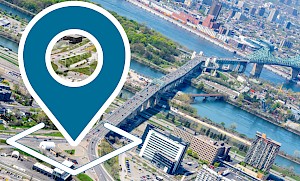Planning of major works for 2024 and recap of the deconstruction of the Original Champlain Bridge
Montréal, April 11, 2024 – Today, The Jacques Cartier and Champlain Bridges Incorporated (JCCBI) presented the work that it will carry out in 2024 on the infrastructure under its responsibility. In the coming months, work will be performed on the Jacques Cartier Bridge, the federal sections of the Bonaventure Expressway and the Honoré Mercier Bridge. At this media briefing, JCCBI also provided a recap of the deconstruction of the original Champlain Bridge.
Bonaventure Expressway
Maintenance work to repair slabs will be carried out on the section of elevated lanes between the Victoria Bridge and the Peel Basin. These activities will require reconfiguring and reducing the number of lanes to two per direction from May to November inclusively. They will also involve complete and partial closures to the expressway and on-ramps at night and on weekends.
Work will also be carried out in the Clément Bridge sector to repair bridge girders and the concrete surfaces of the approach lanes. Several important hindrances are to be expected in this sector. To uphold worker safety, the speed limit will be set at 50 km/h over the entire Bonaventure corridor from June to November inclusively.
Honoré Mercier Bridge
Pier repairs and the cleaning and painting of steel components will also be done in 2024 and will require some night-time closures of the on-ramps and off-ramps on the South Shore side.
Jacques Cartier Bridge
Since February 2024, the cleaning and painting of steel components have had a partial impact on some illumination sections and have required the complete closure of the sidewalk between the Île Sainte-Hélène pavilion and Montréal until the end of November. However, pedestrians can use the multipurpose path during this period.
As part of the plans to maintain the bridge’s service life beyond 150 years, renovations will also be done to the Île Sainte-Hélène pavilion that involve the building envelope, Jacques Cartier bust, windows, mosaic tiling, and pavilion interior. The goal is to extend the life of the pavilion.
This fall, demolition work on the former toll station will take place on the Longueuil side.
Deconstruction following sustainable development principles
JCCBI achieved its goal to successfully deconstruct the historic former Champlain Bridge through in-depth planning to minimize the impact on the environment and the community, and recycle or reuse most of the structure’s materials. Overall, 56 spans, 53 piers and 53 pier footings were deconstructed by Nouvel Horizon Saint-Laurent G.P. (NHSL), a consortium made up of Pomerleau Inc. and Delsan-A.I.M. Environmental Services Inc. This project was completed two months ahead of schedule and within the initial budget of $225.7 million, plus direct costs related to COVID-19 management. Only three complaints were recorded during the 41 months of work.
Here are some other key aspects of the project:
- The deconstruction of this 3.4-km bridge generated 264,000 tonnes of materials: 100% was traced, 96% was recovered (90% was reused and 10% was recycled), resulting in only 4% waste.
- The Canada-wide Material Reuse Competition confirmed 11 creative projects that will leave different legacies in honour of this important Montréal structure.
- Twelve research and development projects are being carried out by eight Canadian research bodies and will be completed in 2025.
- In September 2023, nearly 4,000 keepsake rivets from the bridge’s steel structure were given out to the public in Brossard and on Île des Sœurs.
- A major participatory approach was carried that included 4 information days, 6 public meetings, 23 newsletters, and dozens of meetings with elected representatives, partners and other stakeholders.
- The project included 3 fish habitat compensation projects, the largest of which involved redeveloping 6 hectares of floodplain in Saint-Ignace-de-Loyola.
- The deconstruction project will conclude with the Héritage Champlain project to develop the land freed up on Île des Sœurs, on the Seaway dike and in Brossard now that the bridge is gone.
“Given the scale of the historic deconstruction of the original Champlain Bridge, JCCBI adopted a bold approach to go above and beyond with this project. Although we knew the bridge had to be taken down, we still wanted to leave the community with several tangible gifts. This multifaceted project included environmental protection, material reuse, research, commemorative initiatives, and the redevelopment of public spaces to benefit the community. I firmly believe that we carried out this major project with exemplary respect for the environment and the community,” said Sandra Martel, Engineer and CEO, JCCBI. “I am extremely proud of this result, which came about through meticulous preparation, constant communication, and close collaboration between JCCBI’s teams, the consultants, and our contractor NHSL. I sincerely thank everyone for their contribution,” she concluded.
For more details on this work and the deconstruction project:
About JCCBI
As a manager of important infrastructure, The Jacques Cartier and Champlain Bridges Incorporated is a Crown corporation established in 1978 that is responsible for the Jacques Cartier Bridge, the original Champlain Bridge, the Estacade, the Île des Sœurs Bypass Bridge, the federal sections of Bonaventure Expressway and the Honoré Mercier Bridge, as well as the Melocheville Tunnel. The Corporation manages, maintains, and repairs these important Greater Montréal structures to ensure the safe passage of thousands of users every day. It also ensures that these critical structures remain safe, fully functional and aesthetically pleasing both today and in the future. www.JacquesCartierChamplain.ca
– 30 –
Information
Nathalie Lessard
Director, Communications
JCCBI website: write to Contact us


